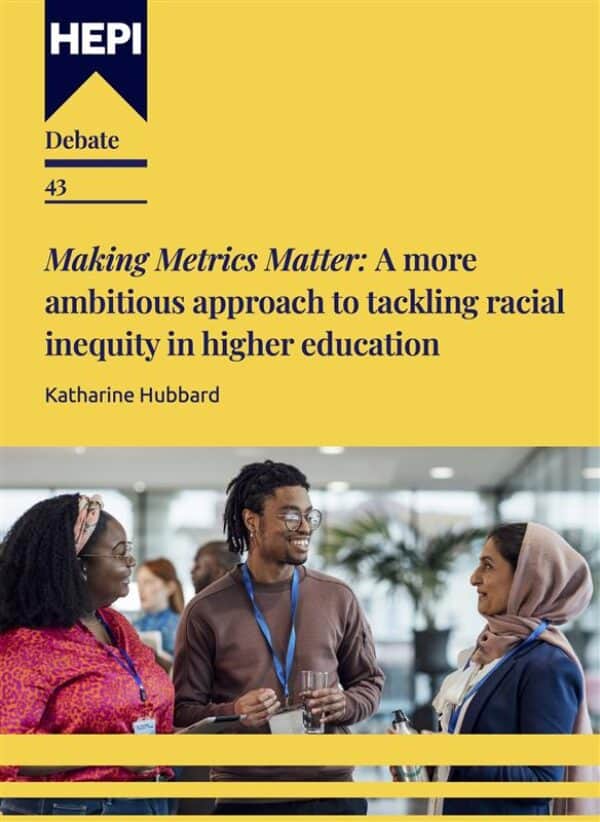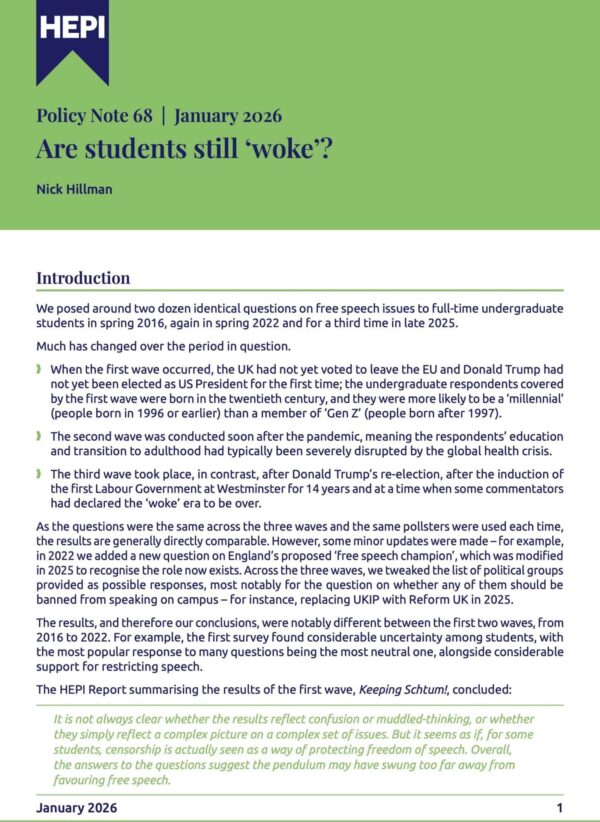Back to the Future? What could system reform of higher education look like?
This HEPI blog was kindly written by Mike Boxall, writing in a personal capacity.
According to the latest survey by PA Consulting, over 90% of university vice-chancellors endorse a call for ‘fundamental system reforms’ to secure the survival of their sector against what they universally regard as an unprecedented combination of existential threats and challenges. Yet the responses seen from across the sector to date have been distinctly conventional and, in a literal sense, conservative: cost-cutting, portfolio rationalisation, recruitment freezes and redundancies, and forgone investments. While undoubtedly necessary in some cases to stave off short-term financial crises, such measures hardly represent transformational innovations; indeed, almost half the survey respondents predicted that their institutions would look and feel much the same in ten years’ time as today. As one vice-chancellor put it:
We have been propping up a 20th-century system that is no longer fit for the purposes of the early 21st century
Meanwhile, policymakers in the Department of Education and the Office for Students are busily preparing contingency measures against the heightened risk of multiple institutional failures and institutions plan for continued retrenchment. Big questions remain unanswered: Why might ‘fundamental system reforms’ be needed? What could (or should) a fundamentally reformed higher education system look like? And how might it be brought about in an era of continued fiscal and policy austerity?
Unlike just about every other sector facing seismic shifts in their markets and operating environments, universities have remained uniformly committed to what many regard as self-limiting and increasingly outdated business models:
- Reliance on providing essentially similar subject-based courses to limited cohorts of school-leavers, largely neglecting the more diverse learning needs of much larger populations of in-career professionals and their employers.
- Adherence to misleadingly named ‘full-time’ study schedules typically limited to 30 weeks a year or less, with single annual entry points and campuses and facilities largely empty of students and staff for almost half the year.
- A deficit-based business model in which devolved expenditure plans are set (and spent) separately from confirmed earnings, often resulting in unexpected year-end shortfalls and relying on cross-subsidies from international student fees to balance budgets.
- Over 150 autonomous and self-determining universities competing with one another for shares of largely fixed or even shrinking markets and funding sources, with success judged more in terms of reputational standings than by the quality and social value of their services.
It must be acknowledged that, despite these self-imposed limitations, the current university system has defied repeated prophesies of its demise. It has survived largely intact for many decades, with few provider closures or even forced mergers, and continues to recruit almost 1.5 million domestic and international students each year, generating over £55 billion in revenues. A handful of global institutions with annual incomes exceeding £1 billion or more may be considered too big and important to fail, and indeed these few continue to do relatively well, often at the direct expense of less-favoured rivals. However, many, perhaps even most, others face a future of chronic struggles to cover inexorably rising costs and to protect their shares of markets eroded by new competitors and alternative options for students, employers, knowledge users and public programmes. Survival for these providers through continued efficiency drives might be possible, but it won’t be fun; nor will it be sufficient to secure the pivotal roles of universities in educating and informing an increasingly complex and precarious world.
The roles and contributions of universities in today’s and tomorrow’s learning society are no less important than in the past, but they will be different. In particular, they have a unique responsibility for sustaining human and social intelligence in the face of impersonal AI and related technological advances. To fulfil this role, universities must move beyond the limitations of their legacy models, expanding their roles within national and localised ecosystems to promote:
- Lifelong and continuous learning and professional development for all adults, from post-secondary to late-career stages, and from initial formation to periodic upskilling and personal renewal, facilitated and supported through the Lifelong Learning Entitlement and related schemes
- Cumulative and personalised learning attainments, embracing the rounded acquisition and development of knowledge, competences, experience and personal development, incorporating micro-credentials and stackable awards on the lines proposed by the OECD
- Variety and choice of accessible pathways through different modes of provision for useful learning as and when sought by individuals and employers, embracing universities, colleges, training providers and online services, as is being developed in Greater Manchester
- Funding and economic structures based on the value and benefits of different modes of learning provision, shared equitably between individuals, employers, civic authorities and the State, on the lines explored by the UNESCO Innovative Funding for Education project.
While fully articulated and integrated learning and skills ecosystems built on these principles may seem a long way off, the examples cited show that prototypes can already be seen in localised initiatives and emerging proposals across the international tertiary formation landscape. A variety of models built around these principles might emerge, displaying the characteristics of complex adaptive systems: self-organising and dynamic networks of diverse partners and stakeholders, producing emergent results in response to changing experiences.
Unpredictable and sometimes surprising outcomes of these kinds cannot easily be planned or fitted into pre-determined blueprints. They are thus unsuited to the normal pattern of government policy interventions. Rather, the role of government should be to provide the enabling conditions and supportive frameworks (including funds) within which self-organising solutions can emerge. A good start would be to reduce the fragmentation of policy, funding and regulatory constraints to innovation and enterprise across existing learning and skills provision. The Commission on Tertiary Education and Research (Medr) in Wales offers a laudable start towards that end, now being emulated in the Republic of Ireland and in New Zealand.
System-wide reforms on this scale do not in any way diminish the importance or critical roles of universities in serving fast-changing national needs for advanced education and skills. What they would do would be to shift the debate on the health of higher education provision from its current focus on enabling universities to continue doing what they have always done, on their own terms, to redefining and consolidating their roles at the heart of sectoral or place-related advanced learning ecosystems. In spirit, if not in forms, this would represent returns to the principles on which most universities (both pre- and post-1992) were first established and which many would argue are needed even more today.







Comments
Ron Barnett says:
Excellent blog, emphasising matters of complexity, turbulence, continuous change, and systems as such.
That VCs find it difficult to conceive of system-change and fundamentally different notions as to what constitutes a ‘university’ isn’t new. When invited by the Dearing Inquiry (1997) to offer ideas of higher education 25 years on, none were received from universities among the 803 responses: such institutional responses as there were offered – as here – tinkering at the margins.
Indeed, it could be said that the blog doesn’t itself go far enough! Surely, the mid-C21 requires a fundamental critique of the very ideas of ‘higher education’ and ‘university’. Without those interrogations, the higher education system will just continue with its present notions, inherited from the past, and now reflecting the system’s total incorporation into ‘cognitive capitalism’.
We need new ideas of the university and higher education fit for a world of nationalistic globalisation, in which AI is increasingly significant, in which ‘research’ and ‘teaching’ and ‘student’ and ‘learning’ are all changing, and in which we should all be educating ourselves throughout our lifespan on this Earth.
We might start by asking ourselves what might be meant by ‘education’ in this milieu (and to see if we can supply answers in which the term ‘skills’ plays only a modest part) and to ask again what might constitute a ‘university’ for (not just ‘in’) a learning society.
Ron Barnett
Reply
David Palfreyman says:
Radical change from within? – very unlikely. End of the medieval model of the U? – perhaps. Back to the c1075 Bologna student consumer controlled U (before eclipsed just fifty years later by the Masters model at Paris, Oxford, Cambridge)? – what an idea!
Reply
Paul Woodgates says:
Lots of interesting ideas here, Mike – but no mention of research. Do you not see a role for the continued coexistence of research and education in universities, or are they destined to become separate functions pursued by separate institutions?
I think the sector is more willing to embrace the kind of transformation envisaged here than it perhaps seems. There are, though, two fundamental constraints that make that very slow to happen. First, the policy, funding and regulatory regime is defined around the traditional model – it’s hard to innovate on the scale suggested here when every part of the “system” drives conformance with the way things are now. And second, there is a huge cultural and social fondness for the status quo: while it may be sensible for us to move to a system of life-long “cumulative and personalised learning attainments, embracing the rounded acquisition and development of knowledge, competences, experience and personal development”, that will be hard to achieve as long as school leavers and their parents (reinforced by league table providers) want three-year full time undergraduate degrees, ideally from the most prestigious institution to which they can gain access.
University leaders may well be sympathetic to the kind of system transformation outlined here, but they still have to pay staff and run estate. Unless and until new ways can be found to allow that to happen from new models, system transformation will be slow in coming.
Reply
Jonathan Alltimes says:
The re-organisation of the universities is not cost free and would incur much administrative expense.
The original purpose of the university was a guild to provide authorised employment for its community of instructors for authorising new instructors by the formation of an organisation which was a juridical person with property rights, so sustaining the existence of the guild beyond the lives of its founding members. What was its original asset?
When the instruction only consisted of the classics and theology, the guild of practitioners knew from experience what they were talking about. Likewise with the later incorporation of the liberal arts, jurisprudence, and medicine into the university, these people were practitioners who prepared students for employment in church, government or private practice.
The modes of instruction appertaining to each knowledge discipline could do with many changes.
“For confirming the Priviledges of the Two Universities;
For the greate Love and Favor that the Queenes most excellent Majestie beareth towardes her Highnes Universities of Oxford and Cambridge, and for the greate Zeale and Care that the Lords and Commons of this present Parliament have for the Mayntenaunce of good and Godly Literature and the vertuouse Education of Youth within either of the same Universities; And to the intent that the auncient Priveleges Liberties and Fraunchises of either of the said Universities graunted ratified and confirmed by the Queenes Highnes and her most noble Progenitors may be had in greater Estymation and be of greater Force and Strengthe, for the
better Increase of Larning and the further suppressing of Vice:”
Source: Oxford and Cambridge Act 1571
Reply
Paul Wiltshire says:
I’d like to go back to a future where we realise that the vast majority of 18 year olds don’t actually need a further 3 years of abstract education before entering the workplace – especially if it lumbers them a life sapping level of debt. I think we should set our DeLorean time machine to 1985 when the HE participation levels were about right.
Reply
Add comment